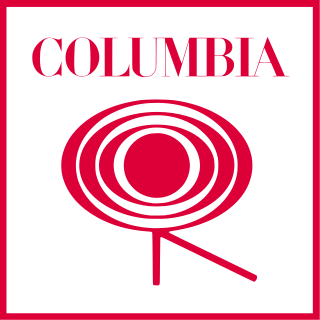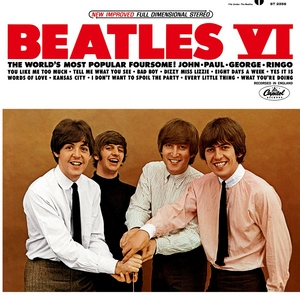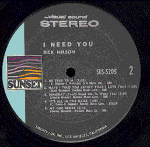
Columbia Records is an American record label owned by Sony Music Entertainment, a subsidiary of Sony Corporation of America, the American division of multinational conglomerate Sony. Columbia is the oldest surviving brand name in the recorded sound business, and the second major company to produce records. From 1961 to 1991, its recordings were released outside North America under the name CBS Records to avoid confusion with EMI's Columbia Graphophone Company. Columbia is one of Sony Music's four flagship record labels: Epic Records, and former longtime rivals, RCA Records and Arista Records as the latter two were originally owned by BMG before its 2008 relaunch after Sony's acquisition alongside other BMG labels.
Motown is an American record label owned by the Universal Music Group. It was founded by Berry Gordy Jr. as Tamla Records on January 12, 1959, and incorporated as Motown Record Corporation on April 14, 1960. Its name, a portmanteau of motor and town, has become a nickname for Detroit, where the label was originally headquartered.

Capitol Records, LLC, and simply known as Capitol, is an American record label owned by Universal Music Group through its Capitol Music Group imprint. It was founded as the first West Coast-based record label of note in the United States in 1942 by Johnny Mercer, Buddy DeSylva, and Glenn E. Wallichs. Capitol was acquired by British music conglomerate EMI as its North American subsidiary in 1955. EMI was acquired by Universal Music Group in 2012, and was merged with the company a year later, making Capitol and the Capitol Music Group both distributed by UMG. The label's circular headquarters building is a recognized landmark of Hollywood, California.

Coral Records was a subsidiary of Decca Records that was formed in 1949. Coral released music by Patsy Cline, Buddy Holly, the McGuire Sisters and Teresa Brewer.

Liberty Records was a record label founded in the United States by chairman Simon Waronker in 1955 with Alvin Bennett as president and Theodore Keep as chief engineer. It was reactivated in 2001 in the United Kingdom and had two previous revivals.

Vee-Jay Records is an American record label founded in the 1950s, located in Chicago and specializing in blues, jazz, rhythm and blues and rock and roll.

Imperial Records is an American record company and label started in 1947 by Lew Chudd. The label was reactivated in 2006 by EMI, which owned the label and back catalogue at the time. Imperial is owned by Universal Music Group.

Eddie Harris was an American jazz musician, best known for playing tenor saxophone and for introducing the electrically amplified saxophone. He was also fluent on the electric piano and organ. His best-known compositions are "Freedom Jazz Dance", popularized by Miles Davis in 1966, and "Listen Here".

PYE or Pye Records is an independent British record label. It was first established in 1955 and played a major role in shaping rock 'n' roll and pop music history. The Pye name was dropped in 1980 due to trademark issues, after which it produced almost no music until the company name and trademark was acquired by the Scottish broadcaster and music producer, Tony Currie, in September 2024.

20th Century Fox Records was a wholly owned subsidiary of film studio 20th Century Fox. The history of the label covers three distinct 20th Century Fox-related operations in the analog era, ranging chronologically from about 1938 to 1981.
Sue Records was also the name of a Louisiana-based record company which owned Jewel Records.

United Artists Records was an American record label founded by Max E. Youngstein of United Artists in 1957 to issue movie soundtracks. The label expanded into other genres, such as easy listening, jazz, pop, and R&B.

The Early Beatles is the Beatles' sixth album released on Capitol Records, and their eighth album overall for the American market. All of the tracks on this album had previously been available on the Vee-Jay Records release Introducing... The Beatles, issued in January, 1964. The front cover photo for this album features the same back cover photo for the British LP Beatles for Sale.

Beatles VI is the seventh Capitol Records studio album by the English rock band the Beatles in the United States and Canada. It was the ninth album released into that market in less than one and a half years. The LP was released in both mono and stereo versions.

Introducing... The Beatles is the first studio album released by the English rock band the Beatles in the United States. Originally scheduled for a July 1963 release, the LP came out on 10 January 1964, on Vee-Jay Records, ten days before Capitol's Meet the Beatles! The latter album, however, entered the U.S. album chart one week before the former. Consequently, when Meet The Beatles! peaked at No. 1 for eleven consecutive weeks, Introducing...The Beatles stalled at No. 2 where it remained for nine consecutive weeks. It was the subject of much legal wrangling, but ultimately, Vee-Jay was permitted to sell the album until late 1964, by which time it had sold more than 1.3 million copies. On 24 July 2014 the album was certified gold and platinum by the RIAA.
Embassy Records was a UK budget record label that produced cover versions of current hit songs, which were sold exclusively in Woolworths shops at a lower price than the original recordings. The original label was active between 1954 and 1965, after which it disappeared when its parent company, Oriole, was taken over by CBS Records.

...And Then I Wrote is the debut studio album by country singer Willie Nelson, recorded during August and September 1962 and released through Liberty Records.

"Mr. Record Man" is a song written by country music singer-songwriter Willie Nelson. After writing the song, Nelson moved to Houston, Texas, where due to his financial issues, tried to sell it to Larry Butler. Butler, who rejected to buy the song, employed Nelson instead. After his original songs turned into hits for other artists, Nelson was signed as a recording artist by Liberty Records.
Mirwood Records was an American record label founded by former Vee-Jay executive Randy Wood in Los Angeles in 1965.
Custom Records was a budget record label owned by the Bihari Brothers.















